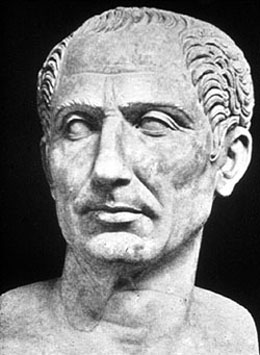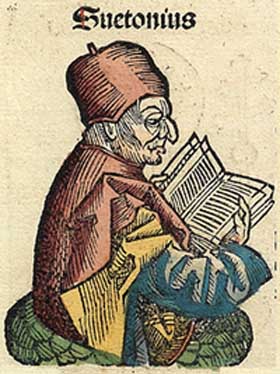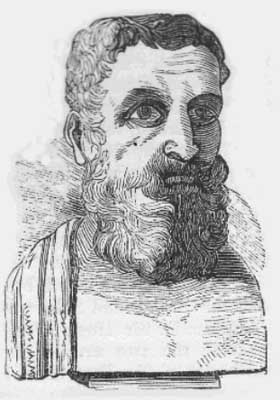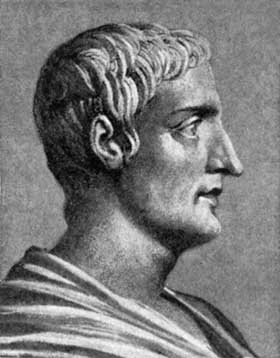
Titus Livy
The historiography we most readily identify with the Romans, coming from sources such as Caesar, Sallust, Livy, Tacitus, and other minor authors, owes much to its early roots and Greek predecessors. However, contrary to the Greek form, the Roman form included various attitudes and concerns that were considered strictly Roman. As the recording of Roman history began to evolve and take shape, many characteristics came to define what we know today as Roman historiography, most notably the strong defense of and allegiance to the Roman state and its wide variety of moral ideals, the factional nature of some histories, the splitting of historiography into two distinct categories, the Annals and the Monograph, and the rewriting of history to suit the author’s needs.
Annals are a year-by-year arrangement of historical writing. In Roman historiography, annals generally begin at the founding of Rome. Proper annals include whatever events were of importance for each year, as well as other information such as the names of that year’s consuls, which was the basis by which Romans generally identified years. The Annal seems originally to have been used by the priesthood to keep track of omens and portents.
The Annales Maximi were a running set of annals kept by the Pontifex Maximus. The Annales Maximi contained such information as names of the magistrates of each year, public events, and omens such as eclipses and monstrous births. The Annales Maximi covers the period from the early Roman Republic to around the time of the Gracchi.
Gracchan Annalist seems to refer to the writers of history in annalistic form who began writing after the time of the Gracchi. Compared to other forms of annalistic history, these seem more fictionalized as Roman historians used their histories to illustrate points about their own time, and were not necessarily out to produce hard fact. Still, Gracchan annalists have produced interesting insight into the writer’s own time, if not necessarily into the time on which they wrote. Sallust and Tacitus are fair examples of Gracchan Annalists.
A monograph is a comprehensive work on a single subject. The monograph could be written about a single event, a technique, rhetoric, or one of any number of other subjects. For example, Pliny the Elder once published a monograph on the use of the throwing-spear by cavalry. Monographs were among the most common historical works found in Roman writings.
Ab urbe condita, literally "From the founding of the city", describes the Roman tradition of beginning histories at the founding of the city of Rome. For examples, see Tacitus, Livy, Sallust, et al. In Livy’s Ab Urbe Condita, much time is spent on the early history of Rome, and on the founding of the city itself. In Sallust’s histories, the founding and early history of Rome is almost reduced to a single sentence. Thus, the ab urbe condita form is extremely variable while continuing to mold Roman histories.
Senatorial History”describes history written by or with information from a Roman Senator. Senatorial histories are generally particularly informative due to their “insider’s” perspective. A general pattern of Senatorial histories is that they seem to invariably contain a reason that the author is writing histories instead of remaining involved in politics.
Sullan annalists politicized their past. They were partisans of the Sullan faction who carried on the Marius and Sulla conflict through their histories, often rewriting them to fit their own agenda. Some Sullan annalists may have been sources for Livy. Valerius Antias (fl. 80-60 BC) was a Sullan annalist but he was not viewed as a credible historian. He seems to have been trying to counter the Marian historian, C. Licinius Macer. Antias’ history, written in seventy-six books, is melodramatic and often filled with exaggerations and lies. In his history, anyone named Cornelius is considered a hero and anyone named Claudius is an enemy and the opposition to the populares never went by a consistent name but were instead called “boni,” “optime” or “optimates,” implying that they were the good guys.
Roman historiography is also very well known for subversive writing styles. The information in the ancient Roman histories is often communicated by suggestion, innuendo, implication and insinuation because their attitudes would not always be well received. Tacitus opposed the emperors and believed that they were one of the reasons for the decline of Rome. Tacitus even wrote disparagingly of Augustus the most celebrated and beloved of the emperors. Of course these opinions had to be veiled since they would not have gone go over very well.
In Roman historiography commentarii is simply a raw account of events often not intended for publication. It was not considered traditional “history” because it lacked the necessary speeches and literary flourishes. Commentarii was usually turned into “history” later on. Many think Caesar’s account of the Gallic Wars, Commentarii Rerum Gestarum (Commentaries on Things Done), was called commentarii for propagandistic purposes. They believe that it is actually “history” since it is so well written, pro-Roman and fits the traditional patterns of historiography.
Ancient Roman historians did not write for the sake of writing, they wrote in an effort to convince their audiences. Propaganda is ever present and is the function of Roman historiography. Ancient Roman historians traditionally had personal and political baggage and were not disinterested observers. Their accounts were written with the specific moral and political agendas. For example Q. Fabius Pictor started the tradition of historiography that was concerned with both morality and history and affirmed the prestige of Roman state and its people.
Ancient Roman historians wrote pragmatic histories in order to benefit future statesmen. The philosophy of pragmatic history treats historical happenings with special reference to causes, conditions and results. In Roman Historiography the facts and an impression of what the facts mean are presented. Interpretation is always a part of historiography; Romans never made any pretense about it. Conflict between the facts and the interpretation of those facts indicate a good historian. Polybius, who wrote in Greek, was the first pragmatic historian. His histories have an aristocratic ethos and reveal his opinions on honor, wealth and war. Tacitus was also a pragmatic. His histories have literary merit and interpretations of facts and events. He was not purely objective, rather his judgments served a moral function.

Titus Livy

Julius Caesar

Suetonius

Sallust

Tacitus
Polybius (c. 208-116 BC) was a prominent Greek who figured strongly in the Achaean League. Upon being captured by the Romans and transported to Rome, Polybius took it upon himself to record the history of Rome in order to explain Roman tradition to his fellow Greeks. He wanted to convince them to accept the domination of Rome as a universal truth. His main work, Histories, is extant despite its being fragmented.
Diodorus Siculus was a Greek historian of the 1st century BC. His main body of work was the Bibliotheca, which consisted of forty books and was intended to be a universal history from mythological times to the 1st century BC. He employed a very simple and straightforward style of writing, and relied heavily on written accounts for his information, most of which are now lost. Often criticized for a lack of originality and deemed a 'scissors and paste' historian, Diodorus endeavored to present a comprehensive human history in a convenient and readable form.
Dionysius of Halicarnassus (fl. c 8 BC.) was a Greek historian and critic living in Rome. His major work was Roman Antiquities, a history of Rome from its mythical beginnings until the first Punic war, consisting of 20 books. Generally he is considered to be a less reliable source than most of the other historians, but he does fill in the gaps in Livy's accounts. Other works include: On Imitation, On Dinarchus, On Thucidides, and On the Arrangement of Words.
Pliny the Elder, uncle of Pliny the Younger, wrote in the 1st century AD. He was an officer in the Roman military who died in the eruption of Mount Vesuvius in 79 AD. His known works include Naturalis Historia, which is a collection of books on natural history, Bella Germanica, a 21 book history of the German wars which occurred during his lifetime, and a 31 book history of Julio-Claudian Rome.
Titus Flavius Josephus (born AD 39) was a Jewish historian and apologist. His works include The Jewish War (75 to 79), Jewish Antiquities (93), The Life (95) and Against Apion (Publication date unknown). He was influenced by Thucydides and Polybius and was endorsed by the Emperor Titus. Though many critics thought that he was a traitor to his people, his writings show that he was a zealous defender of the Jewish faith and culture.
Appianus of Alexandria (circa 95-165) wrote in Greek his Romaiken istorian Roman History, about half of which survives. This work is best known for its coverage of the Civil Wars of the late Republic (in his Books XIII to XVII).
Appian addresses here the period roughly from 133 to 35 BC, i.e., from the reforms of Tiberius Gracchus to the death of Sextus Pompey.
Dio Cassius was a distinguished Greek senator. After establishing his political career, Dio Cassius began to write various literary works. His most famous and recognized work is called the Roman History, which consists of 80 books. This work is dominated by the change from a Roman republic to a monarchy of emperors, which Dio Cassius believed was the only way Rome could have a stable government. Today, the only surviving portion of the Roman History is the part from 69 BC to AD 46.
In his 31 book history, sometimes translated as The Roman History or The Roman Empire, Ammianus Marcellinus described the time from the reign of Nerva to the Battle of Adrianople, though the first thirteen books are lost. Bringing into the remaining books his own personal experiences in military services, his writing had a unique descriptive quality, of the geography, the events, and even the character of the actors. There is an active debate about whether the intent of the history was a continuation of Tacitus.
The Scriptores Historiae Augustae is a compilation of biographies of the Roman emperors from 117 to 284. Though claimed to be written by several different authors, contemporary research has shown that it may have only been written by one writer. This one author may have had good reason to disguise his identity, since much of the information in the Scriptores has also been found to be very unreliable.
In Late Antiquity, a great quantity of breviaria, or short historical works, were published (see Aurelius Victor, Eutropius, Festus, Epitome de Caesaribus). They had a common source, the so-called Enmannsche Kaisergeschichte (Enmann's History of the Emperors), which is lost.
Zosimus was a pagan historian who wrote at ca. 500 AD a history of Rome to 410 in six books. Although he couldn't be compared with Ammianus Marcellinus, his work is important for the events after 378.
The important histories of Priscus and Olympiodorus of Thebes are lost excerpt for some fragments.
Velleius Paterculus was a Roman historian who lived from around 19 BC to after AD 30. He wrote Historiae Romanae, which is a summary of Roman history from the founding of the city to AD 30. Though almost all of his work is now missing, it is still a valuable source on the reigns of Augustus and Tiberius. He “represents the adulatory type of history condemned by Tacitus, who ignores Velleius, as do all ancient authorities.”
ANCIENT AND LOST CIVILIZATIONS